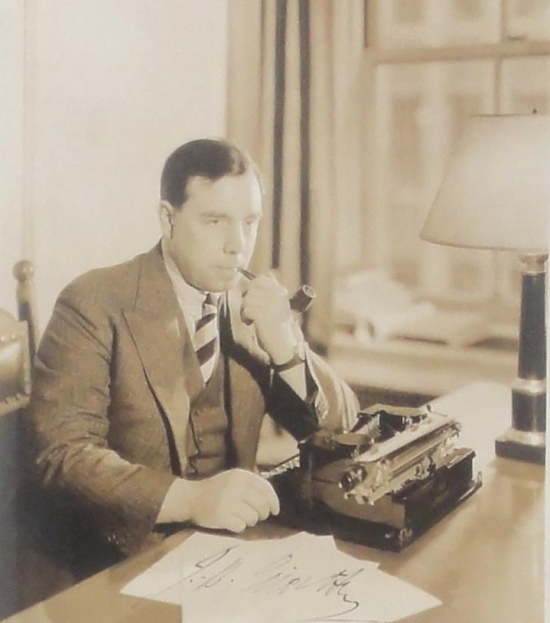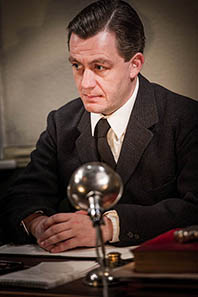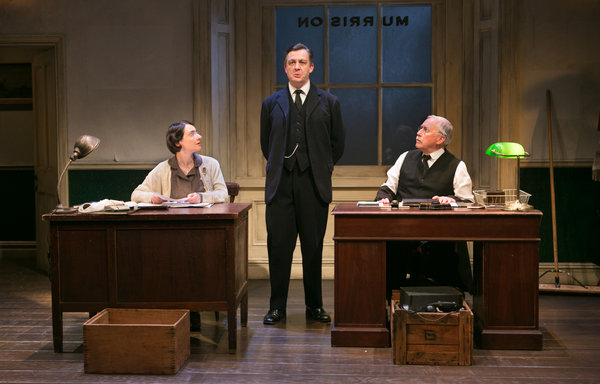Cornelius’ Is Revived at 59E59 Theaters
If you were on a sinking ship, the title character of J. B. Priestley’s “Cornelius” would be just the man you’d like as your captain, at least as embodied by Alan Cox in the wonderful production at 59E59 Theaters, part of the Brits Off Broadway festival. It’s not that Cornelius is so resourceful that he would save you from drowning.
But he’d make going under more entertaining than it has any right to be, while ensuring that no one on board succumbs to soppy excesses of feeling. Stoic, philosopher, fantasist and eccentric, Cornelius — that’s his last name, nobody uses his first — absorbs his inevitable doom in such style that he makes you forget about your own. He is, in short, the sort of stage-worthy hero who could have been made only in England.
It is not a ship that Cornelius commands, but a small London business in its death throes. First produced in 1935, this play is unmistakably from and about the Depression in Britain, which may account for its original lack of success. Though Priestley (1894-1984) was already a well-known dramatist and fiction writer, “Cornelius” ran for a disappointing seven weeks in the West End. It was largely forgotten, except by Priestley scholars, until its revival in London last year.
That production, expertly directed by Sam Yates at the small but fertile Finborough Theater, is the same one that opened on Tuesday night in its New York premiere. This engagingly acted show had British critics singing hosannas for a play that echoed all too resonantly in the hard times of the early 21st century, and they weren’t wrong. The specters of unemployment and poverty stalk the play, inspiring both Darwinian struggle and existential crises.
But for me the great fascination of “Cornelius” is Cornelius, a prototype for a kind of divided self that would be resurrected many times and in many forms in the British theater. His descendants include characters created, with varying degrees of affection and anger, by John Osborne, Simon Gray and Alan Bennett. Often men of charismatic wit and intelligence who know life has defeated them, they are both of their society and outside it, wry and eloquent witnesses to their own entrapment.
Cornelius is a more easily embraceable, less threatening avatar of this spirit than, say, Osborne’s Jimmy Porter (“Look Back in Anger”) or Gray’s Butley. Still, this is no cuddly-toy quirky Briton. At one point Cornelius presents one of the most persuasive defenses of suicide set forth in the mainstream English-speaking theater.
The paradox is that this speech is made by a man who is unmistakably a life force, the sort of character around whom plays are written. A similar quality of doubleness pervades “Cornelius,” which is appropriate to the work of a writer who was a traditionalist in style and a Socialist and Jungian in thought.
On the one hand “Cornelius” is a warm, entertainingly old-fashioned, well-made drama, with standard-issue supporting characters like the gawky, irreverent office boy, the adoring spinster secretary, the reliable old devoted employee and the lovely young, head-turning newcomer. At the same time it coolly portrays the casualties of an economic system spinning off its axis.
Unlike Stephen Daldry’s celebrated revival of Priestley’s better-known “An Inspector Calls,” this “Cornelius” is no postmodern reinterpretation. As designed by David Woodhead and acted with in-the-moment precision, Mr. Yates’s production is a work of straightforward naturalism, with subtle suggestions of the numinous provided by Howard Hudson’s lighting and Alex Baranowski’s music.
The setting is the well-worn office of Briggs & Murrison, an aluminum importing firm that, like many small Depression-era businesses, is under siege by its creditors. Mr. Briggs no longer exists, and as the show begins, Murrison (Jamie Newall) is on the road, supposedly drumming up business. (The play might have been called “Waiting for Murrison.”) That leaves the other partner, Cornelius, in charge. He occupies this position with a sprightly ambivalence, doing his brisk best to stave off bankruptcy (and the desperate small-time salesmen who invade his office) while wistfully contemplating the road not taken.
Cornelius, given virtuosic life by Mr. Cox, exudes an infectious, vital engagement with the world around him and a self-aware distance from it. Combined, these traits suggest a flamboyant soul confined to a drab role in life. He’s a funny man, even when he doesn’t mean to be, but that humor is set off by an essential sadness.
Small wonder that every woman whose path he crosses appears to wind up a little in love with him, including two secretaries, affectingly embodied by Pandora Colin (pinched and resentful as the plain one) and Emily Barber (an instinctive, confident charmer as the pretty one). Don’t expect any of these people to share a bower of bliss, though. This is one of those British dramas (are there any other kind?) in which to live is to be lonely.
The stiff-upper-lip sentimentality implicit in this perspective, and in the play’s portrait of its hero’s tragically thwarted imagination, could cloy. But there’s a ruthlessness in the script that Mr. Yates and Mr. Cox hew to throughout. And while there’s a lot of talk of buying and selling, with the attendant figures, “Cornelius” is never dry.
Biddle (an excellent Col Farrell), the firm’s orderly bookkeeper, tells Cornelius that he’s never bored by what he does because numbers to him are like living creatures, with different personalities. “Like all of us,” he adds. In like manner, this fine, loving production finds the pulsing individuality within a play that is finally something more than the by-the-numbers formula that shapes it.
Cornelius
Interview with Alan Cox and Sam Yates
Further details
Original show
http://www.finboroughtheatre.co.uk/productions/2012/production---cornelius.php
New York transfer
http://www.59e59.org/moreinfo.php?showid=118
Contact
Emily Dobbs
Producer, Jagged Fence Ltd.
e. jaggedfencetheatre@gmail.com
t. +44 7855 284 350


